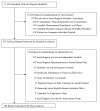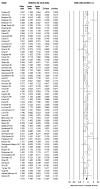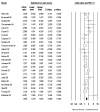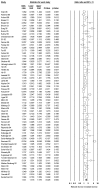Social relationships and mortality risk: a meta-analytic review
- PMID: 20668659
- PMCID: PMC2910600
- DOI: 10.1371/journal.pmed.1000316
Social relationships and mortality risk: a meta-analytic review
Abstract
Background: The quality and quantity of individuals' social relationships has been linked not only to mental health but also to both morbidity and mortality.
Objectives: This meta-analytic review was conducted to determine the extent to which social relationships influence risk for mortality, which aspects of social relationships are most highly predictive, and which factors may moderate the risk.
Data extraction: Data were extracted on several participant characteristics, including cause of mortality, initial health status, and pre-existing health conditions, as well as on study characteristics, including length of follow-up and type of assessment of social relationships.
Results: Across 148 studies (308,849 participants), the random effects weighted average effect size was OR = 1.50 (95% CI 1.42 to 1.59), indicating a 50% increased likelihood of survival for participants with stronger social relationships. This finding remained consistent across age, sex, initial health status, cause of death, and follow-up period. Significant differences were found across the type of social measurement evaluated (p<0.001); the association was strongest for complex measures of social integration (OR = 1.91; 95% CI 1.63 to 2.23) and lowest for binary indicators of residential status (living alone versus with others) (OR = 1.19; 95% CI 0.99 to 1.44).
Conclusions: The influence of social relationships on risk for mortality is comparable with well-established risk factors for mortality. Please see later in the article for the Editors' Summary.
Conflict of interest statement
The authors have declared that no competing interests exist.
Figures






References
-
- House JS, Landis KR, Umberson D. Social relationships and health. Science. 1988;241:540–545. - PubMed
-
- Berkman LF, Blumenthal J, Burg M, et al. Effects of treating depression and low perceived social support on clinical events after myocardial infarction: the Enhancing Recovery in Coronary Heart Disease Patients (ENRICHD) Randomized Trial. JAMA. 2003;289:3106–3116. - PubMed
-
- McPherson M, Smith-Lovin L. Social Isolation in America: Changes in core discussion networks over two decades. Am Sociol Rev. 2006;71:353–375.
-
- Putnam RD. Bowling Alone: The collapse and revival of American community. New York, NY, US: Simon & Schuster; 2000.
-
- Cohen S, Gottlieb BH, Underwood LG. Social Relationships and Health. In: Cohen S, Underwood LG, Gottlieb BH, editors. Measuring and intervening in social support. New York: Oxford University Press; 2000. pp. 3–25.
Publication types
MeSH terms
LinkOut - more resources
Full Text Sources
Other Literature Sources
Medical

